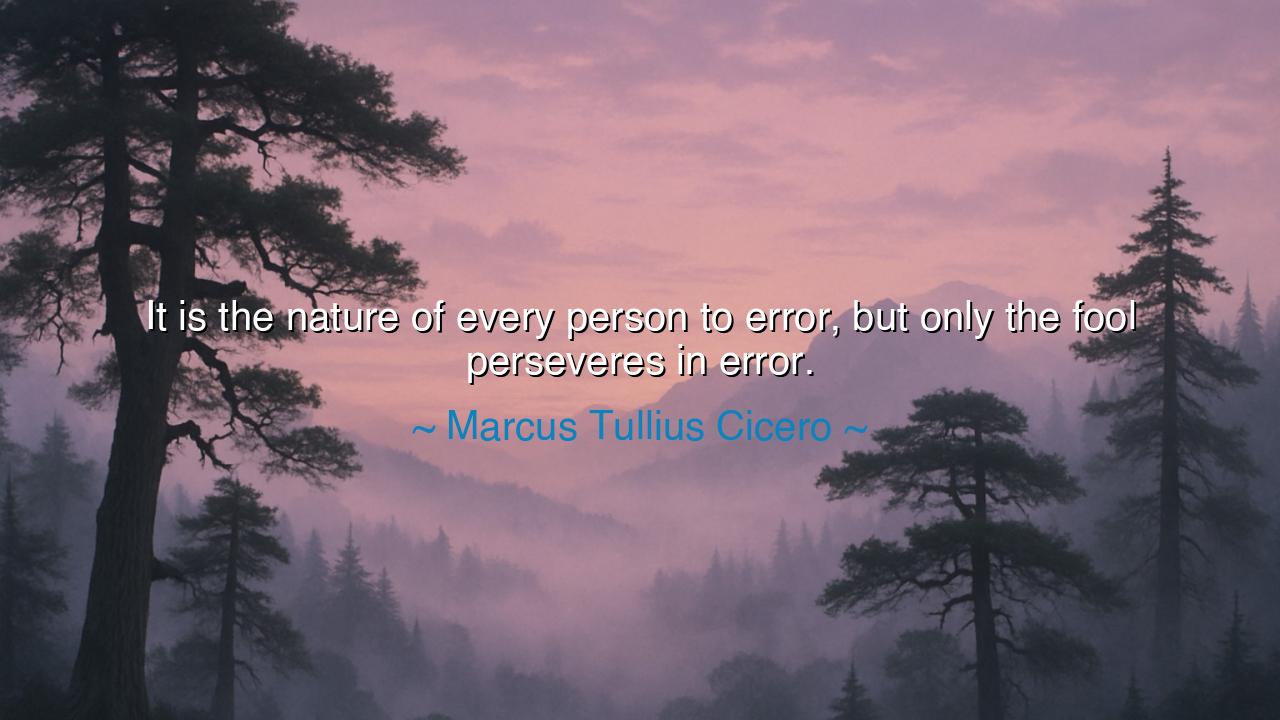
It is the nature of every person to error, but only the fool






Marcus Tullius Cicero, the great Roman orator and statesman, once declared: “It is the nature of every person to error, but only the fool perseveres in error.” These words, though born in the ancient world, are eternal in their wisdom. They speak to the condition of humanity itself, for no man, however wise or noble, escapes the weakness of making mistakes. To stumble is part of our nature. But to remain in the mire after stumbling—to defend our errors out of pride or stubbornness—that, Cicero warns, is the mark of the fool.
The meaning of this quote is at once humbling and liberating. Cicero acknowledges that to err is human; it is the inevitable shadow cast by our limited understanding. Yet he draws a sharp line between the wise and the foolish. The wise recognize their mistakes, learn from them, and rise stronger. The fool, blinded by arrogance, clings to falsehoods, repeating them until ruin overtakes him. Thus the error itself is not the true danger—the true peril lies in the refusal to correct it.
The origin of these words lies in Cicero’s reflections on philosophy and public life. As a man who navigated the storms of Roman politics, he saw firsthand how leaders, unwilling to admit fault, led nations to disaster. His own age was one of civil strife, betrayal, and ambition. In this chaos, Cicero observed that those who could humbly acknowledge missteps were preserved, while those who hardened their hearts against truth became enslaved to their own folly. His teaching is not abstract but born from blood and fire, from the ruins of a republic undone by the pride of its rulers.
History offers us vivid examples of Cicero’s wisdom. Consider Napoleon Bonaparte, a man of genius and vision who conquered much of Europe. Yet when warned against invading Russia in 1812, he pressed forward, convinced of his invincibility. The error of overreaching might have been forgiven if quickly corrected, but his stubborn perseverance in that error led to the destruction of his army and the collapse of his empire. Here we see the distinction Cicero makes: the first mistake is human; persisting in it is the downfall of the fool.
On the other hand, let us remember Abraham Lincoln, who at the beginning of the American Civil War erred in his military appointments, choosing leaders who faltered. But Lincoln did not cling to his choices out of pride; he replaced them, learned from their failures, and grew into one of history’s most steady and adaptable leaders. His willingness to correct himself, even at the cost of admitting error, transformed him from a struggling statesman into a figure of enduring greatness.
Cicero’s wisdom is therefore a call to humility and courage. Humility, to acknowledge that we are fallible creatures who will stumble again and again. Courage, to face the shame of admitting fault and to turn from it before it consumes us. The error itself is not fatal; the refusal to change is. To cling to mistakes is to dig one’s own grave, while to abandon them is to walk the path of growth.
What, then, is the lesson for us? That in every failure, we must pause, reflect, and ask: Am I the wise who learn, or the fool who persists? We must cultivate the discipline to listen when corrected, to observe when reality contradicts our desires, and to let go of pride that binds us to falsehood. In our personal lives, in our work, in our relationships, the ability to admit wrong and change course is the mark of true strength.
So remember the words of Cicero, children of tomorrow: “It is the nature of every person to error, but only the fool perseveres in error.” Do not fear your mistakes, for they are your teachers. Fear instead the hardness of heart that refuses to learn. For the wise rise from their errors as stronger men and women, but the fool, chained to his folly, walks willingly into ruin. Choose, then, the way of wisdom—confess, correct, and continue onward.






AAdministratorAdministrator
Welcome, honored guests. Please leave a comment, we will respond soon